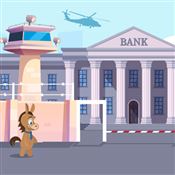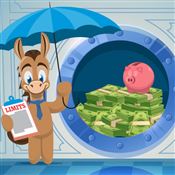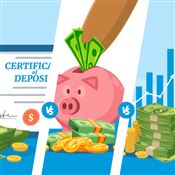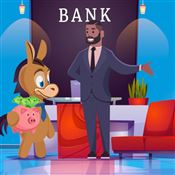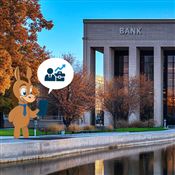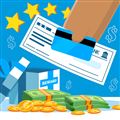Is My Money Safe in the Bank
Money is generally safe in a bank, whether short or long-term. You've got deposit insurance like the FDIC to thank for peace of mind.
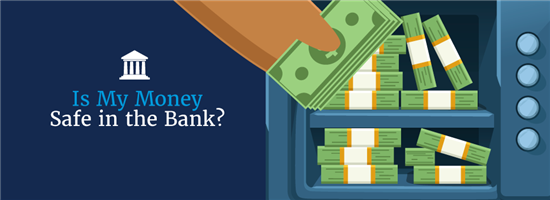 |
With 5 bank failures in 2023[1], you might be worried that your bank is next. But, reality may not be as concerning as you think.
Thanks to certain regulations, banks continue to be a secure option for storing money. Keep reading to know how safe your money is in a bank. And, discover what steps to take in case of a bank failure.
Is My Money 100% Safe in a Bank?
Yes, your money is generally safe in a bank up to a certain amount. That's due to the Federal Deposit Insurance Corporation or the FDIC. Deposits are covered up to $250,000 for individual accounts and $500,000 for joint accounts.[2]
Here are the deposit accounts with FDIC coverage.
- Checking accounts
- Savings accounts
- Money market deposit accounts
- CDs
- Prepaid cards (subject to certain FDIC requirements)[3]
So, even if your bank fails or closes down, you are guaranteed to get your money back up to the maximum amount allowed by law.
How Do Banks Handle Account Fraud?
The bank typically investigates reported fraudulent transactions. These include those arising from identity theft, within 10 business days (or up to 20 days for new accounts).[5]
If the problem isn't resolved within this time frame, they may issue temporary credit (for the affected amount minus a maximum of $50) to your account. Afterward, the bank has up to 45 business days to reach a final verdict.
- Carried out in a foreign country;
- Occurred within 30 days of account opening; or
- A debit card point-of-sale purchase.
However, should the transaction be proven valid, no refund will be given. If you received temporary credit, you will be notified before the amount is deducted from your account.
Your trust in a bank depends on your specific preferences. Banks thrive on customer trust, often built through factors like a long track record indicating stability. Some prioritize factors like quality customer service and strong cybersecurity measures. Ultimately, the choice of which bank to trust with your money is yours.
How to Avoid Bank Fraud
Here are a few best practices that can help so you don't fall victim to bank fraud and identity theft:
- Use strong passwords.
- Enable biometric authentication.
- Do not access your online banking using public Wi-Fi.
- Regularly monitor your bank accounts.
- Avoid opening links from unsolicited emails.
- Secure your paper bank documents.
- Take advantage of the security tools provided by your bank.
- Cash checks that are only paid out to you.
Fraud is a risk that can jeopardize your money's safety in the bank, but it's not the only concern. The next section will tackle another significant issue: bank failure.
Why Do Banks Fail?
Banks fail when they can't fulfill obligations to depositors and creditors, typically due to these reasons:
- Poor risk management
Banks don't just hold your deposits; they invest them to grow your money. So, if they make poor decisions like lending to borrowers who can't repay their loans, the consequences can be catastrophic. - Economic downturns
A bank's financial health depends a lot on the economy.[6] In a recession, banks may struggle to get payments from borrowers, and the value of their assets can decrease, impacting their finances. - Fraud and mismanagement
This may involve those who hold key positions in the bank engaging in insider trading or selling important information to give an unfair advantage. - Loss of depositor confidence
When people lose trust in a bank because of controversies, they might start taking out their money, causing a bank run. This can deplete the cash reserves of a bank and create a crisis. - Contagion effect
Although this is not usually the case, a bank's closure can trigger a chain reaction, which can be made worse during a period of financial crisis.
While the thought of a bank failing can be unsettling, there are steps you can take to safeguard your money.
While there is no financial institution that is entirely risk-free, your money is not likely to be too vulnerable when it is in your deposit account, which has minimal risks by itself. In addition, it will help to regularly monitor your banking activities and report any irregularity or suspicious activity immediately.[7]
How To Protect Your Money From Bank Collapse
Amidst a bank collapse, you can follow these tips to keep your money safe or reduce its impact:
- Don't make impulsive decisions
If you find out your bank's market value has dropped significantly, keep calm and avoid making rash decisions. Taking out all your money might cause unnecessary worry among other depositors which can lead to a bank run. - Monitor your bank's financial health
Stay informed about your bank by checking their quarterly or annual reports for any irregularities. This can prepare you for potential issues and help you in making practical decisions. - Ensure your bank is FDIC-insured
As a preventive measure, choose a bank that is FDIC-insured for peace of mind. FDIC coverage guarantees deposits up to the maximum allowed by law in case of a bank failure. - Diversify your investment portfolio
Spread your funds across multiple banks and investments to protect against total loss if one fails. However, remember to stay within the FDIC limit to ensure full coverage in case of bank failure.
Aside from these tips, explore alternative ways to store your money (besides using banks) in the next section.
If your bank fails, you are entitled to get your money back up to $250,000 per ownership category thanks to FDIC insurance. You should be able to receive your insurance proceeds at the soonest time, or within 2 business days.[8]
Alternatives to Banks
If you're looking for other safe places to store your money outside of banks, check out the following alternatives:
- Credit unions
Credit unions, usually nonprofit and member-centric, tend to avoid greater risks with your deposits compared to major banks. Their decisions are often made with the best interests of their members in mind, if not upon their approval. - Federal bonds
Federal bonds are considered by many to be one of the safest places to invest your money. It is backed by the US government and is viewed as a low-risk, stable asset. - Real estate
Real estate is a physical asset with lower volatility than riskier investments. It is a popular choice today because of rising rent and housing prices. - Gold
Investing in gold is good if you want to diversify your portfolio. It does not rely heavily on stocks and bonds, and it can also work as a hedge against inflation.
FAQs
Can banks seize your money if the economy fails?
The bank cannot legally seize your money from your account during an economic crisis or failure. It may only become vulnerable if uninsured during a bank closure or stolen by fraudulent means.
Can the FDIC fail?
In theory, the FDIC can still fail just as other established institutions are not failure-proof. However, this is an unlikely occurrence given that it is fully backed by the U.S. government.[9]
How to maximize FDIC insurance at one bank?
If you have a lot of money and are concerned about FDIC limits, here's how you can maximize your coverage:
- Open a joint account, which can raise your insured amount to $500,000.[10]
- Consider an IntraFi Network deposit.[11]
- Explore other account options with different ownership categories.[12]
Bottom Line
Your money is generally secure in a bank thanks to insurance. You can take comfort in knowing that most banks are federally insured, meaning your funds won't vanish if the bank faces difficulties.
However, with the risk of hackers and identity thieves, taking a proactive approach will enhance the safety of your money in the bank.
References
- ^ Federal Deposit Insurance Corporation. Bank Failures in Brief - 2023, Retrieved 1/01/2024
- ^ Federal Deposit Insurance Corporation. Insured Deposits, Retrieved 10/31/2023
- ^ Federal Deposit Insurance Corporation. FDIC Consumer News: Is the Money on My Prepaid Card FDIC-Insured?, Retrieved 1/01/2024
- ^ Office of the Comptroller of the Currency. Are the deposits in my bank insured? What is FDIC insurance?, Retrieved 01/15/2024
- ^ Consumer Financial Protection Bureau. How Do I Get My Money Back After I Discover An Unauthorized Transaction Or Money Missing From My Bank Account?, Retrieved 10/18/2023
- ^ Federal Deposit Insurance Corporation. The FDIC And The Banking Industry:
Perspective And Outlook, Retrieved 10/31/2023 - ^ Office of the Comptroller of the Currency. How Do I Identify Phishing Scams and Avoid Becoming a Victim?, Retrieved 10/18/2023
- ^ Federal Deposit Insurance Corporation. When a Bank Fails - Facts for Depositors, Creditors, and Borrowers, Retrieved 10/18/2023
- ^ Federal Deposit Insurance Corporation. Symbol of Confidence, Retrieved 10/18/2023
- ^ Federal Deposit Insurance Corporation. DI Guide Bankers - Joint Accounts, Retrieved 10/18/2023
- ^ IntraFi. How it Works, Retrieved 10/18/2023
- ^ Federal Deposit Insurance Corporation. DI Guide Bankers - General Principles of Insurance Coverage, Retrieved 10/18/2023
Write to Penelope Besana at feedback@creditdonkey.com. Follow us on Twitter and Facebook for our latest posts.
|
|
| ||||||
|
|
|
